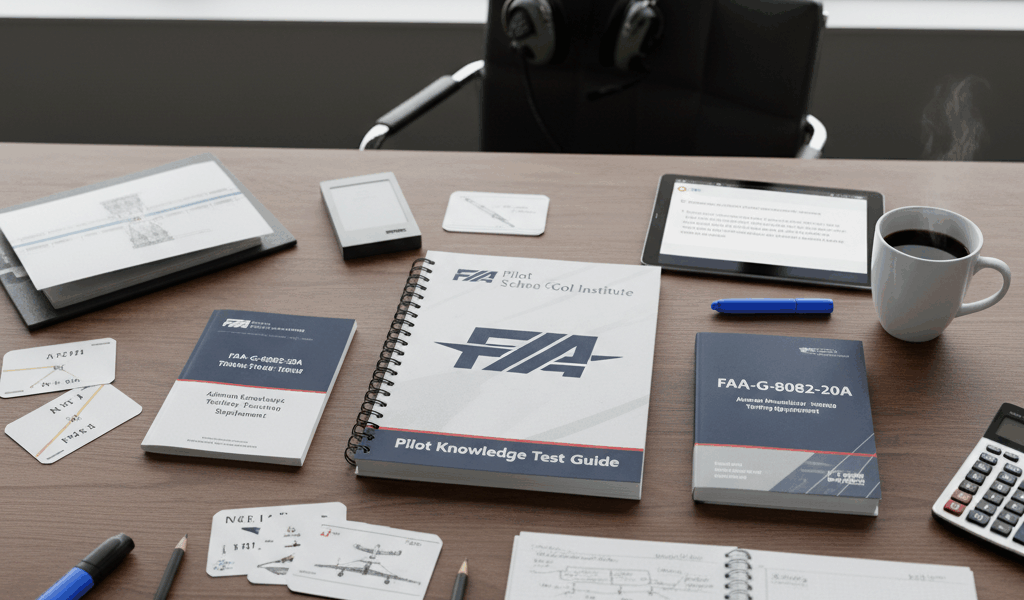The FAA PSI Exam: What You Actually Need to Know
So you want to take an FAA exam? Whether you are going for your private pilot license, commercial rating, or mechanic certification, you will end up at a PSI testing center. I have been through this process, and let me tell you – it is not as scary as it seems, but it helps to know what you are getting into.
Wait, What is PSI?

PSI Services LLC is basically the company the FAA trusts to run their knowledge tests. They have got testing centers all over the country – probably one within driving distance of wherever you are. These folks handle everything from getting you registered to handing you your score report.
Think of them as the middleman between you and the FAA. You study the material, they provide the controlled environment to prove you know it.
The Different Exams – Which One is Yours?

Here is the quick rundown of what you might be taking:
- Private Pilot (PPL): Your first ticket to the skies. Covers navigation, weather, regulations, all the foundational stuff. This is where most people start.
- Commercial Pilot (CPL): Ready to get paid? This one digs deeper into advanced procedures and the commercial aviation world.
- Airline Transport Pilot (ATPL): The big leagues. If you want to fly for the airlines, this is the knowledge test you need to pass.
- Airframe and Powerplant (A and P): For the mechanics out there. Actually, it is two exams – one for airframe stuff, one for powerplant systems. Gotta know both to be fully certified.
- Part 107 (Remote Pilot): Drone pilots, this is you. Commercial drone operations require this certificate, and the exam is not a joke.
How to Actually Prepare
Here is the thing – these exams are passable if you put in the work. The FAA literally publishes most of the material you need to study. The Pilot Handbook of Aeronautical Knowledge, the Airplane Flying Handbook, various advisory circulars… it is all out there.
But here is my honest advice: do not just read the handbooks. Use a test prep course. Sheppard Air, Sportys, King Schools – pick one and work through it. They have figured out the patterns, the question styles, what the FAA actually asks versus what they could theoretically ask.
Practice tests are your friend. Take them until you are consistently scoring in the high 80s or 90s. The real exam will not surprise you as much if you have seen similar questions a hundred times already.
Scheduling and Showing Up
Getting a test date is pretty straightforward. Head to PSI website, create an account, pick your exam and location. Most testing centers have availability within a week or two – longer during busy seasons.
On test day:
- Bring two forms of ID (one with photo)
- Show up 30 minutes early
- Leave your phone in the car – seriously, they do not play around with electronic devices
- Expect to be recorded the whole time
The testing room is quiet, clinical, kind of stressful if you are not expecting it. But once you start clicking through questions, you settle into a rhythm.
What the Test Actually Looks Like
Multiple choice, all of it. The number of questions varies by exam – private pilot is 60 questions, you get 2.5 hours. You need 70 percent to pass.
They give you a calculator and access to reference materials (like sectional chart excerpts for certain questions). Some questions require actual calculations – fuel consumption, weight and balance, that sort of thing.
Do not rush. You have got time. Read each question twice. Eliminate the obviously wrong answers first.
After the Exam
You will know immediately whether you passed. The computer spits out a score report right there. If you passed, congratulations – take that report to your flight instructor or examiner for the next step.
If you did not pass? Hey, it happens. The report shows which areas you were weak in. Study those, wait the required time period, and schedule a retake. Plenty of great pilots did not pass everything on the first try.
Why This Matters
These certifications are not just paperwork. Aviation is one of those fields where knowledge actually matters – like, peoples lives depend on pilots and mechanics knowing their stuff. The FAA testing requirements exist for good reason.
Getting through PSI exams is a rite of passage in aviation. Everyone who flies or works on aircraft has sat in that testing center chair, nervous about whether they studied enough. You are not alone in that feeling.
Keep Learning After the Test
One more thing: passing the knowledge test is not the end. Aviation constantly evolves. New regulations, new technology, new procedures. Most certificates require ongoing training, flight reviews, recurrent testing.
Think of the PSI exam as your foundation. What you build on it determines how far you go in aviation.
Good luck. You have got this.
Recommended Aviation Gear
David Clark H10-13.4 Aviation Headset – $376.95
The industry standard for aviation headsets.
Pilots Handbook of Aeronautical Knowledge – $25.42
Essential FAA handbook for every pilot.
As an Amazon Associate, we earn from qualifying purchases.



